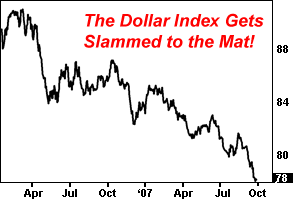A One-Two Punch for the US Dollar from the East
Currencies / US Dollar Sep 28, 2007 - 08:44 AM GMTJack Crooks writes: The U.S. dollar index has just plunged to its lowest level of all time.
Back in 1992, its extreme intraday low was 78.19. Yesterday, it reached 78.16 – a historic event that signals a stronger and more imminent cascade of selling to hit the dollar from all sides.
Already Black and Blue, the Dollar Could Get Hit by a Powerful One-Two Punch
Right now, I see two very real – and growing – threats to the dollar. And it's important that you understand these threats because they could easily turn the dollar's 12-round fight into a sudden knockout.
Either one could send the greenback reeling. Together, they could prove to be an extremely powerful combo:

Punch #1: Saudi Arabia and Gulf Nations Hold the Fate of the Dollar in Their Hands
Last week I told you how Saudi Arabia delivered a smack in the face to the Federal Reserve. Namely, the Saudi government opted not to loosen up its monetary policy after Bernanke slashed U.S. rates by half a percentage point.
Remember, the Saudi currency, the riyal, is pegged to the U.S. dollar. So in order to maintain that peg, they'd have to stick with a policy consistent with ours.
This begs the question: How will Saudi Arabia avoid the next step, as Kuwait did earlier this year, and formally break its dollar peg?
It probably won't! Indeed, Saudi Arabia is fed up with the dangerous side-effects of being pegged to the struggling buck. Like other oil-rich gulf nations, the country is being paid for its oil with an ever weakening currency. Inflation is surging, while the value of all the Kingdom's surplus dollars are sinking fast.
There are three possible Middle East moves that could seal the dollar's fate …
First, the Saudis could begin unloading their dollars by selling off their massive stash of dollar reserves.
Second, other oil-rich nations may follow the Saudis' lead.
Third, these oil-rich nations could eventually decide to price their oil in other currencies! A few years ago, this would have been unthinkable. Now, it's being widely discussed and seriously considered. It just goes to show you how quickly the tables can turn.
Any one of these three moves would ultimately mean more pain for the greenback. And if we see all three events unfold, the dollar would meet Mr. Canvas in a hurry.
To make matters worse, the Middle East isn't the only region duking it out with the dollar. The Far East could also start slugging away …
Punch #2: Inflation Rubs China the Wrong Way. So Asian-Block Currencies Could Rocket Higher
Unfortunately, the same thing that's bothering Saudi Arabia – inflation – is also pestering China. In fact, China's inflation rate just spiked to an annualized ten-year high of 6.5%.
Here's why that poses such a big problem:
Much of China's population is made up of working class citizens who perform heavy labor and receive light paychecks. So the percentage of household income devoted to basic necessities is far higher than in the West, and there's no room for price increases on basics like food and energy.
That's why Beijing took the unusual step last week of declaring a freeze on prices on many key commodities. But price controls almost never work in the real world. And that leaves China with only one other option:
China could allow its currency to appreciate, which would push the dollar down further …
A more valuable currency effectively reduces the cost of a country's imports, precisely what China needs right now to offset inflation.
Before, the West was pushing China to revalue its currency higher, but China was resisting. Now, both China and the West will be on the same page.
Result: Expect to see a much faster appreciation in the value of the Chinese currency over the next couple of months. That's bad news for the dollar for two reasons:
A. China will have less need to hold so many dollars in its currency reserves. That immediately translates into less demand for the buck.
B. A rising Chinese currency will drive up the value of most other Asian currencies, too. Many other Asian nations either explicitly or implicitly suppress the value of their currencies to stay competitive with cheap Chinese exports. So wherever China's currency goes, other Asian currencies will likely follow.
Important note: Japan is China's biggest export competitor. So you could expect the yen to rise sharply if China let its currency gain.
Look, I hate seeing the dollar take a beating as much as anyone. But there's no denying that it's fighting for its life right now. I will be watching from my ringside seat, and if I see major moves about to happen … you'll be among the first to know.
Best wishes,
By Jack Crooks
This investment news is brought to you by Money and Markets . Money and Markets is a free daily investment newsletter from Martin D. Weiss and Weiss Research analysts offering the latest investing news and financial insights for the stock market, including tips and advice on investing in gold, energy and oil. Dr. Weiss is a leader in the fields of investing, interest rates, financial safety and economic forecasting. To view archives or subscribe, visit http://www.moneyandmarkets.com .
Money and Markets Archive |
© 2005-2022 http://www.MarketOracle.co.uk - The Market Oracle is a FREE Daily Financial Markets Analysis & Forecasting online publication.



